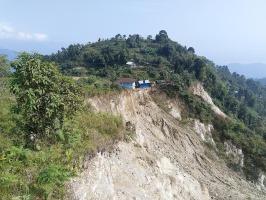印度卡林邦的滑坡灾害:时间问题?
IF 3.4
2区 社会学
Q1 GEOGRAPHY
引用次数: 0
摘要
本文对最近关于将灾害风险管理下放到印度山区的呼吁进行了批判性思考。印度喜马拉雅地区(IHR)的山区特征与印度本土平原的物理特征之间的差异经常被认为是需要下放权力的原因。权力下放的支持者有时会指出,有关山区的决策往往是在平原城市做出的,因此不太可能考虑这些政策对印度喜马拉雅地区自然景观的影响。我将这一论点称为 "山丘-平原灾害管理叙事",并将其与第一手定性数据进行权衡,这些数据讲述了印度西孟加拉邦卡林邦地区人们对山体滑坡的原因和影响的体验。文章的结论是,卡林邦滑坡风险管理政策与现实脱节,与平原和山区自然地理之间的不协调关系不大。文章认为,这些脱节更多是山体滑坡影响的时间性与国家愿意并能够提供支持的时间性不同的产物:它们是时间问题。文章最终提出的问题是,是否应将向山区下放灾害风险管理权力的呼吁与向印度下放灾害风险管理权力的更广泛呼吁区分开来。本文章由计算机程序翻译,如有差异,请以英文原文为准。

Landslide disasters in Kalimpong, India: Matters of time?
This article critically reflects on recent calls for the decentralisation of disaster risk management to the mountainous regions of India. The physical differences between the mountainous characteristics of the Indian Himalayan Region (IHR) and the plains of mainland India are often cited as the reason why this decentralisation is needed. Proponents of decentralisation sometimes point out that decisions about the mountains are often made in cities in the plains and are thus less likely to consider the impacts of such policies on the physical landscape of the IHR. This argument, which I refer to as the hills-plains narrative of disaster management, is weighed against first-hand qualitative data that narrates people’s experiences of the causes and impacts of landslides in Kalimpong District, West Bengal, India. The article concludes that the disconnects between policy and reality when it comes to landslide risk management in Kalimpong are only weakly related to the dissonances between the physical geographies of the plains and the mountains. The article argues these disconnects are more products of the differing temporalities of landslide impacts and the temporalities for which the State is willing and able to provide support: that they are matters of time. The article ultimately questions whether calls for the decentralisation of disaster risk management to mountain areas should be separated from wider calls for the decentralisation of disaster risk management in India.
求助全文
通过发布文献求助,成功后即可免费获取论文全文。
去求助
来源期刊

Geoforum
GEOGRAPHY-
CiteScore
7.30
自引率
5.70%
发文量
201
期刊介绍:
Geoforum is an international, inter-disciplinary journal, global in outlook, and integrative in approach. The broad focus of Geoforum is the organisation of economic, political, social and environmental systems through space and over time. Areas of study range from the analysis of the global political economy and environment, through national systems of regulation and governance, to urban and regional development, local economic and urban planning and resources management. The journal also includes a Critical Review section which features critical assessments of research in all the above areas.
 求助内容:
求助内容: 应助结果提醒方式:
应助结果提醒方式:


